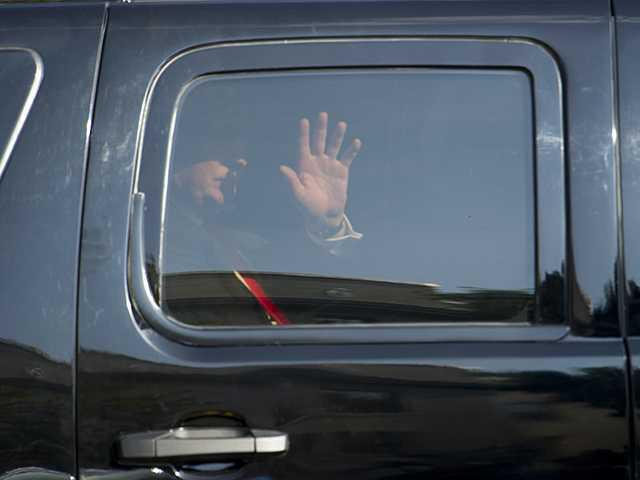WASHINGTON - A defiant Donald Trump made it clear he won't change his brash tone or message as he courted anxious Republican lawmakers Thursday, blaming the media for stumbles that continue to alarm GOP leaders and energize Democrats with voting less than three months away.
The New York billionaire repeatedly called for unity in his second Capitol Hill tour in three months, but he also threatened would-be party critics on a day that was designed to rally anxious Republicans behind him. Deflecting questions about his discipline in public comments, Trump insisted his recent praise for former Iraqi leader Saddam Hussein was taken out of context and ignored fresh concern about a campaign tweet widely condemned as anti-Semitic, according to Republicans who attended closed-door meetings.
Arizona Sen. Jeff Flake declined to address reports that Trump threatened to attack him politically during a testy exchange that Sen. John McCain said "everybody was talking about" afterward.
"I'll just leave it," Flake told reporters. "My position remains, I want to support the nomination. I really do. I just can't support him given the things that he's said."
Sen. Mark Kirk of Illinois, who wasn't in Thursday's meeting, fired back at Trump, who reportedly called him a loser during the private gathering.
"We haven't seen a personality like his too much in the Midwest. Eastern, privileged, wealthy bully," said Kirk, who faces a tough re-election contest and has declined to endorse Trump.
There was a more cooperative tone inside Trump's meeting with House Republicans, even if skeptical lawmakers didn't necessarily hear what they were hoping for.
"There was no talk of pivoting. There was no talk of changing his style or anything like that," said Rep. Peter King of New York. "I think you have to expect that you're going to get Donald Trump. But he showed today that he could be Donald Trump and still work with Republicans."
Trump's unwillingness to moderate his tone follows repeated promises from campaign officials that he would do just that as he shifts toward the general election. While Election Day nationwide is Nov. 8, early voting begins in some states in September.
The Republican Party remains deeply divided with its national convention less than two weeks away.
Trump's former rival, Texas Sen. Ted Cruz, announced Thursday he would speak at the Cleveland gathering. Yet many high-profile Republicans are refusing to go, former Republican Presidents George H.W. Bush and George W. Bush, 2012 nominee Mitt Romney and Ohio Gov. John Kasich among them.
Utah Sen. Orrin Hatch does plan to attend, but he shared his concerns about Trump's campaign.
"I hope he will focus less on personality and divisive rhetoric and more on policies and a capacity to govern effectively," Hatch said after the Senate meeting.
Nebraska Sen. Ben Sasse, a Trump critic, was less polite: "This election remains a Dumpster fire. Nothing has changed," said Sasse spokesman James Wegmann.
The party strife played out as Republicans tried to focus on Democrat Hillary Clinton's email practices, which FBI Director James Comey described as "extremely careless." Comey spent much of the day testifying before a House committee, summoned by Republican lawmakers furious about his decision, announced Tuesday, that Clinton should not face criminal charges.
But Trump has struggled to keep the focus on his Democratic rival.
The night before his Washington tour, he resurrected a debate over an image he tweeted depicting Clinton's face alongside a six-pointed star over hundred-dollar bills. Many saw the symbol as a Star of David and condemned the tweet as anti-Semitic. House Speaker Paul Ryan, the nation's top elected Republican, was among the critics.
Trump also continues to defend his praise for Hussein, the Iraqi dictator whom he described as having been effective at killing terrorists.
Rep. Chris Collins, a big backer, said he blamed Trump's missteps, including the outcry over his Hussein comments, on Democrats and an unfriendly press.
"His point was: They set us up," said Collins. "And we just need to make sure we stay together."
At one point, Trump turned directly to Ryan and seemed to acknowledge the lingering concerns. "If you read the headlines in the paper, I could see why some folks might be worried," Collins recalled Trump saying.
That explanation was well-received.
Trump also emphasized his plan to repeal President Barack Obama's health law, reduce regulatory burdens, overhaul tax laws and remake the Supreme Court as "one that is more reflective of the values of the country," according to Rep. Tom Price of Georgia.
Ryan told reporters later, "We clearly have a presumptive nominee who wants to work with us on moving this agenda forward."
Others were less impressed, especially when Trump responded to a question about whether he would defend Article 1 of the Constitution on the separation of powers.
Trump said he would defend articles "1, 2, 3 to 12," said South Carolina Rep. Mark Sanford. In fact, there are only seven articles.
"I think it was the normal stream of consciousness that's long on hyperbole and short on facts," Sanford said.

